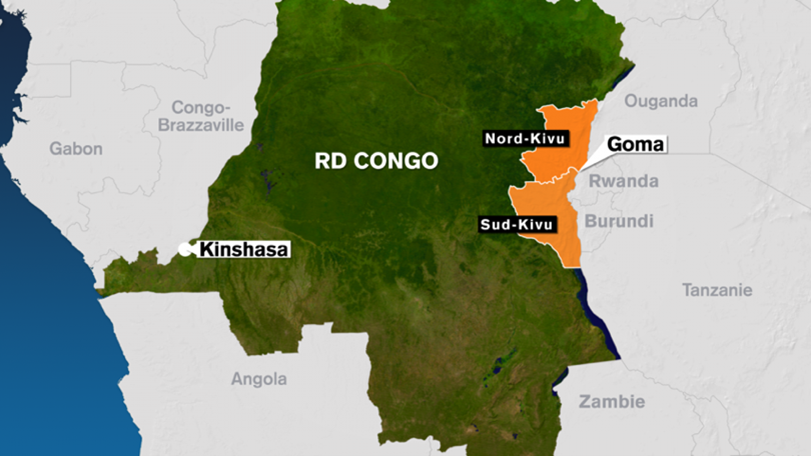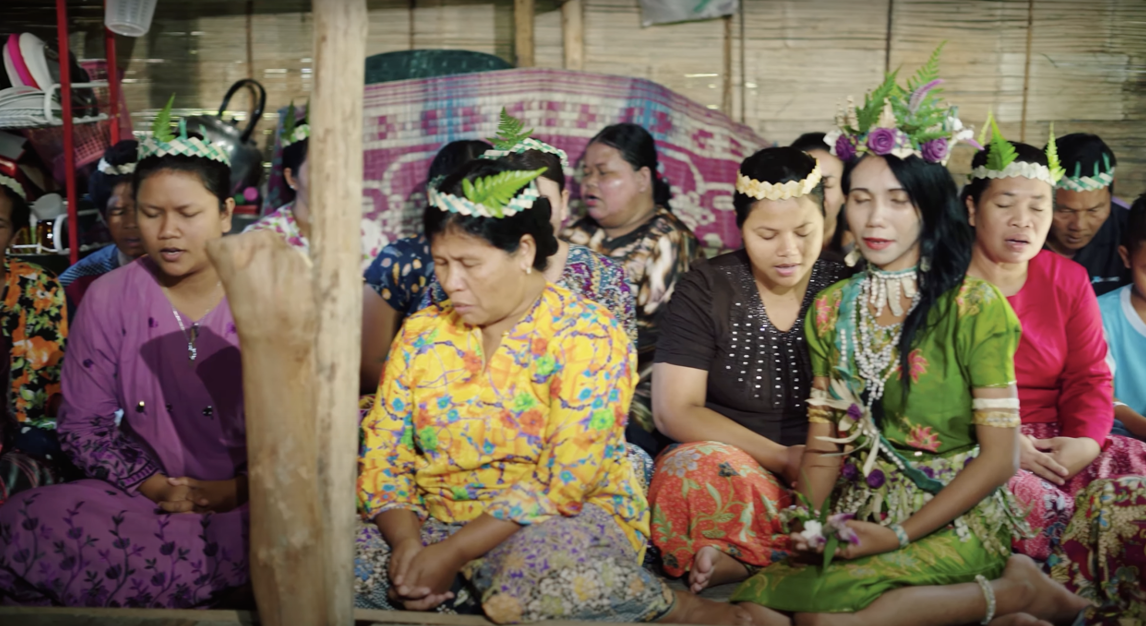By Inès Najeh / GICJ
In the Democratic Republic of the Congo (DRC), two displaced camps near the city of Goma, specifically Lac Vert and Mugunga, fell victim to bomb attacks on 3 May 2024. According to the United Nations Organization Stabilization Mission in the DRC (MONUSCO), this attack resulted in at least 12 deaths and 31 injuries. However, various NGOs and media outlets have reported at least 40 deaths and many more injured. These camps provide refuge for thousands fleeing conflict between the M23 armed group and the Congolese army in the surrounding areas. MONUSCO denounced the attacks as having been committed by M23 rebels, which were also accused by the Congolese army and American diplomacy.
In recent months, the M23 group managed to seize several towns near Goma and continue to advance in the region despite efforts from the national army to counter their rebellious acts. The group’s progress in eastern Congo poses a significant threat to the millions of internally displaced Congolese (over 500 000 people in Goma) trying to avoid the growing violence and massacres. Ms Binto Keita, the Special Representative of the Secretary General of the UN in the DRC, and head of MONUSCO, expressed concern over the targeting of civilians by all parties of the conflict. She then called on all parties to uphold international humanitarian law and asked to prioritise the protection of civilians, who suffer the most from the ongoing conflict.
Background
 The DRC, situated in central Africa, is the continent's second-largest country by land mass. Kinshasa is the capital and serves as the administrative, cultural and economic center of the country. Despite the nation's abundant natural resources such as gold, cobalt, petrol, oil, and diamonds, its population does not benefit from this wealth and faces severe hardships. The continuous and new conflicts arising in the Congolese territory, such as the fighting between rebel groups, the DRC government and other external actors, exacerbate the situation for the population.
The DRC, situated in central Africa, is the continent's second-largest country by land mass. Kinshasa is the capital and serves as the administrative, cultural and economic center of the country. Despite the nation's abundant natural resources such as gold, cobalt, petrol, oil, and diamonds, its population does not benefit from this wealth and faces severe hardships. The continuous and new conflicts arising in the Congolese territory, such as the fighting between rebel groups, the DRC government and other external actors, exacerbate the situation for the population.
The eastern regions of South and North Kivu are particularly impacted by ongoing violence from various armed groups, contributing to internal displacement and human rights abuses. Indeed, the M23, accused of being at the origin of the bombing on the displaced camps in 3 May 2024, is among the region’s most notable insurgent military groups, that broke away from the Congolese army in 2000s, and is composed of ethnic Tutsis. From 2012 to 2013, M23 gained significant influence in eastern DRC, by committing violent acts against the civilian population, exacerbating the humanitarian situation in the country. The revelation of Rwanda's support for M23 had repercussions on the relationship between Kigali (Rwanda) and Kinshasa. Indeed, it is rumoured by the international community that Rwanda is actively supporting the rebel group. Despite the accusations made against Rwanda, the country has not acknowledged or confessed to them.
Efforts to deal with these problems include both military actions and talks between countries, but the root issues such as the governance of the country, resource exploitation and tense relationships between neighbouring countries continue to fuel the cycle of violence and instability in the region.
The complex relationship between DR Congo and Rwanda impacting the present conflict
Congo became independent on 30 June 1960, was renamed Republic of Congo, and Patrice Lumumba became the first Prime minister of the new “free” country. The new government did not last long, however, as Mobutu Sese Seko launched a coup d’état and took power in 1965. The dictator Mobuto stayed in power until 1997, installing a system of repression and corruption. However, Mobutu’s power was declining notably after the genocide of the Tutsi in Rwanda in 1994 causing a mass exodus of Tutsi refugees to camps in eastern Zaire (nearly 2 million).
Laurent Désiré Kabila, the main opponent of Mobutu, convinced the Rwandan Patriotic fronts, the Tustsi-led government of Rwanda, that Hutu groups in Zaire were still a threat under the Mobutu regime. This alliance was the start of a massive involvement of multiple neighbouring countries in Congo’s affairs. It led to the First Congo War between 1996 and 1997, where Congo-Tusti militias, Rwandan and Ugandan forces fought against Mobutu’s armed forces. The war was won by the Rwandan coalition and Kabila was placed as president of the new DRC.
Unfortunately, in 1998, due to the deteriorating relations between Kigali and Kinshasa, the second war broke out, when Rwandan and Ugandan forces turned against President Kabila and decided to overthrow his government. This war is often called the “Great War of Africa ‘’ due to the involvement of nine countries fighting on the Congolese territory, making this conflict even more complicated with different rebel groups and government forces. It was only in April 2003 that the Pretoria Accord was signed, after which Rwandan, Ugandan, Angolan and other forces withdrew, and the war was officially over. The effects of the war remained strongly felt throughout the region, however, having left a legacy of violence and instability in the country.
The current Kivu conflict started shortly after the “Great war of Africa”. This conflict is mostly located in eastern provinces of the North and South Kivu within the territory of the DRC, and involves multiple national, regional and international actors competing for the control of the Congolese territory, especially for the power that would come from controlling the abundance of natural resources, especially minerals in the area. The ongoing conflict in the DRC highlights the government’s inability to assert control over a territory rich in valuable minerals like gold, tin, diamonds, and more. Despite the abundance of resources, local communities very rarely reap the benefits. These minerals are vital for modern electronics, driving tensions among various groups competing to seize them illegally. This confrontation leads all involved parties to exploit resources for weapons or personal gain. Indeed, international actors, such as the United States of America and China, play a leading role in the conflict by buying mining products, thus indirectly financing the illegal armed groups that control production.
Even though this conflict started in the early 2000s it regained momentum in 2022 when violence escalated in North Kivu and the Ituri province. Neighboring countries are directly or implicitly involved, like Rwanda, through the financing of rebels, mostly driven by strategic interest, historical grievances, and the desire to access to numerous lucrative resources. The Kivu conflict represents an important geopolitical crisis characterised by the crucial actors, struggling for power.
The humanitarian crisis and its recognition by the international community
For the past two years, the conflict in Kivu between the M23 and the Congolese army has intensified, thereby amplifying the already ongoing humanitarian crisis for civilians. Not only are over 6 million people internally displaced in Ituri, North Kivu, and South Kivu, they also suffer from torture, forced labor, and sexual violence. The rape cases against young girls have raised great concern. Anny Tenga Modi, Executive Director and Co-Founder of AFIA MAMA, has reported a total of 35,000 cases of sexual violence between January and June 2023. During the 9427th meeting of the UN Security Council, in September 2023, Ms Modi urged the Congolese Government to ensure the effectiveness of the national reparations fund for victims of sexual violence in conflict.
In an effort to get the conflict recognised and for the main actors involved to be sanctioned, the DRC ratified the Rome Statute in April 2002, and, in April 2004, the situation was then referred to the International Criminal Court (ICC). The ICC’s investigations in the DRC have focused primarily on war crimes and crimes against humanity allegedly committed in the east of the country, in the Ituri region and the provinces of North Kivu and South Kivu, since 1 July 2002. The investigations resulted in a number of cases, 6 to be exact, in which the alleged crimes included war crimes and crimes against humanity, such as enlisting and conscripting children under the age of 15 and making them actively participate in hostilities, murder, attacks on civilians, rape, sexual slavery of civilians, displacement of civilians, and torture.
As the humanitarian situation worsened, Bintou Keita, has stated that insecurity has continued to spread, requiring greater efforts to protect civilians. There is a clear concern coming from UN bodies and states themselves, but that is far from being enough as the situation continues to worsen for civilians. During the 55th session of the Human Rights Council, the UN High Commissioner for Human Rights, Volker Türk, expressed concern and stated that over 2,100 human rights violations and abuses happened between October 2023 and March 2024, most of them committed by armed groups. According to the Commissioner, “many of these serious human rights violations could amount to atrocity crimes, and the alleged perpetrators and their accomplices must be held to account”. As MONUSCO continues to pull out of the country this year, he urged authorities to protect civilians and strengthen national armed forces in MONUSCO areas to prevent armed groups from exploiting a “security vacuum”. There is an urgent need for dialogue to restore order and peace in the country.
Finally, despite limited attention on the Congolese crisis, multiple humanitarian aid plans have been put into place to help those in need across the country. Notably among these is the UN Refugee Agency, a humanitarian response plan seeking $2.6 billion to aid approximately 8.7 million individuals launched in February 2024.
Geneva International Center for Justice (GICJ) calls on the DRC to increase its efforts in protecting victims of attacks and displaced civilians, notably by strengthening safety in displaced camps. Regarding the crisis in Congo DR and the alarming escalation of violence that continues to destroy the nation and its population. We firmly condemn the atrocities such as the recent bombings of displaced camps. GICJ emphasises that the crisis in Congo demands urgent and decisive action from the international community. The current level of violence and suffering endured by Congolese civilians is unacceptable and cannot be ignored any longer. GICJ highlights that while some efforts have been made, they are insufficient in addressing the root causes of the conflict and providing meaningful assistance to those affected. Therefore, we call for increased involvement and commitment from international parties to intervene effectively, protect civilians, and work towards sustainable peace and stability in Congo.
#Congo #DRC #Justice #Accountability #Bombing #HumanitarianCrisis #InternationalHumanitarianLaw #fHumanRights #GenevaInternationalCenterforJustice #Geneva4Justice







